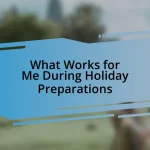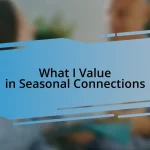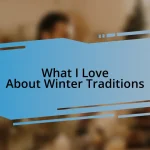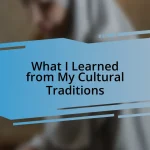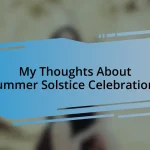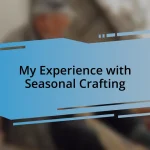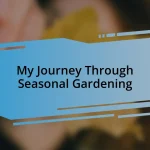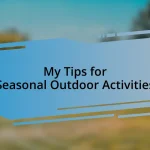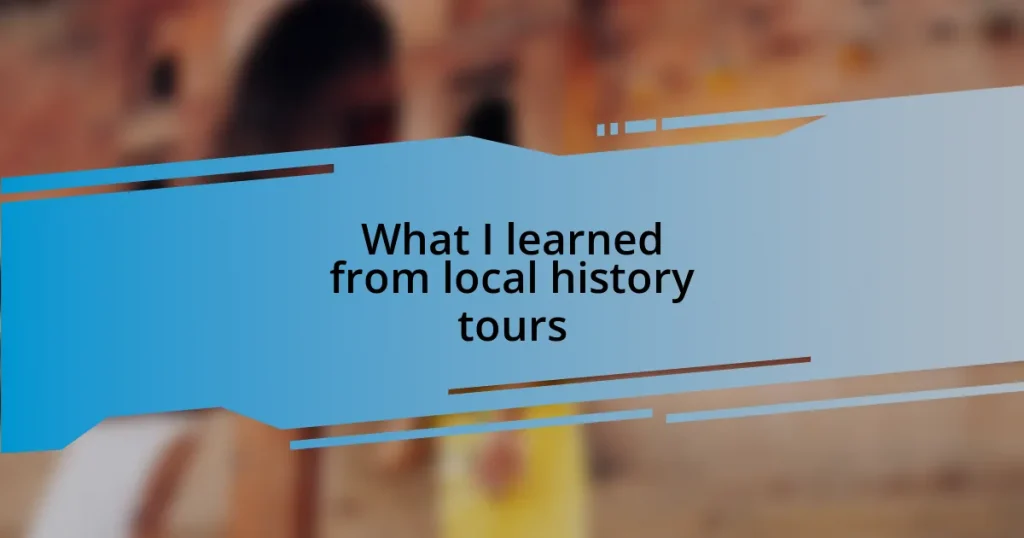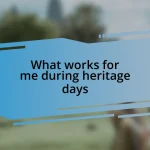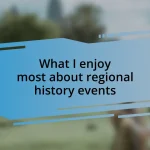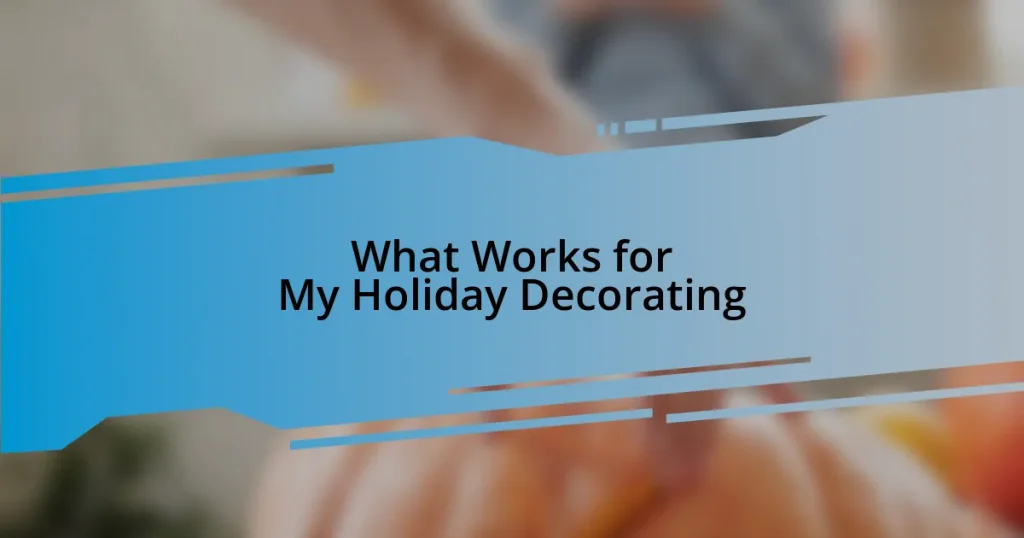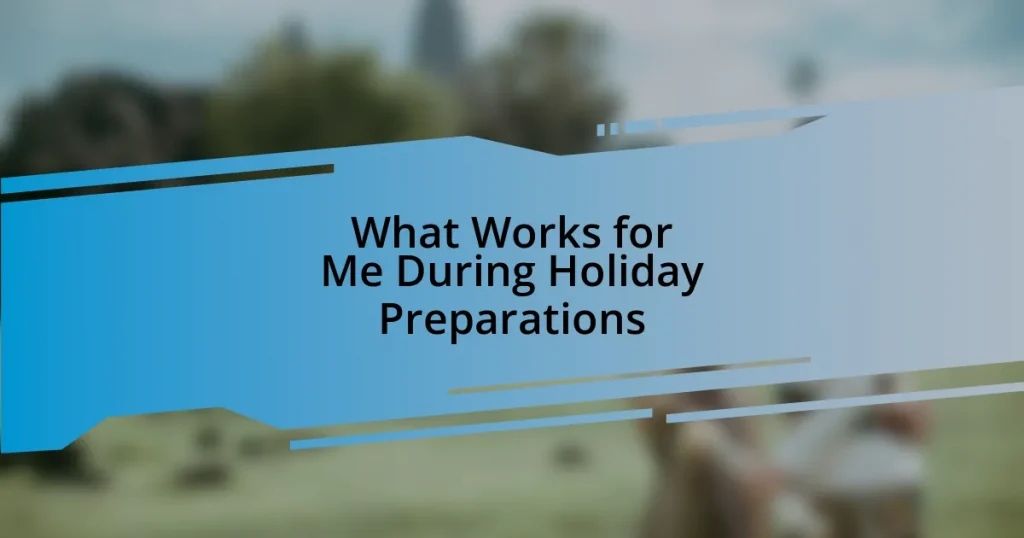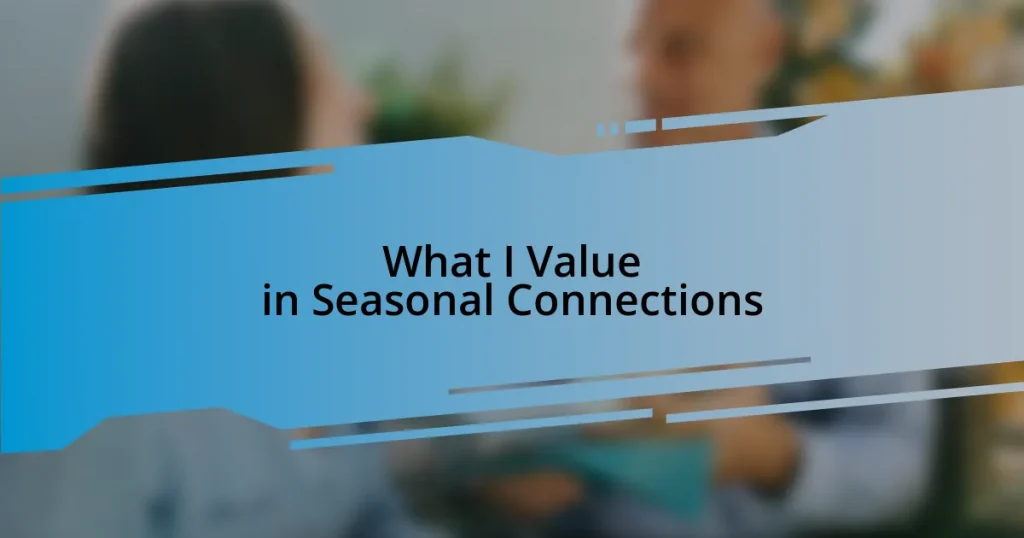Key takeaways:
- Local history tours uncover personal and collective narratives that shape community identity and foster a sense of belonging.
- Participation enhances appreciation and knowledge of familiar places through engagement with lesser-known facts and stories.
- Building connections with fellow participants and local historians enriches the experience and encourages deeper exploration of shared history.
- Planning personalized tours allows for thematic exploration and discovery of hidden local gems, making history more relatable and impactful.
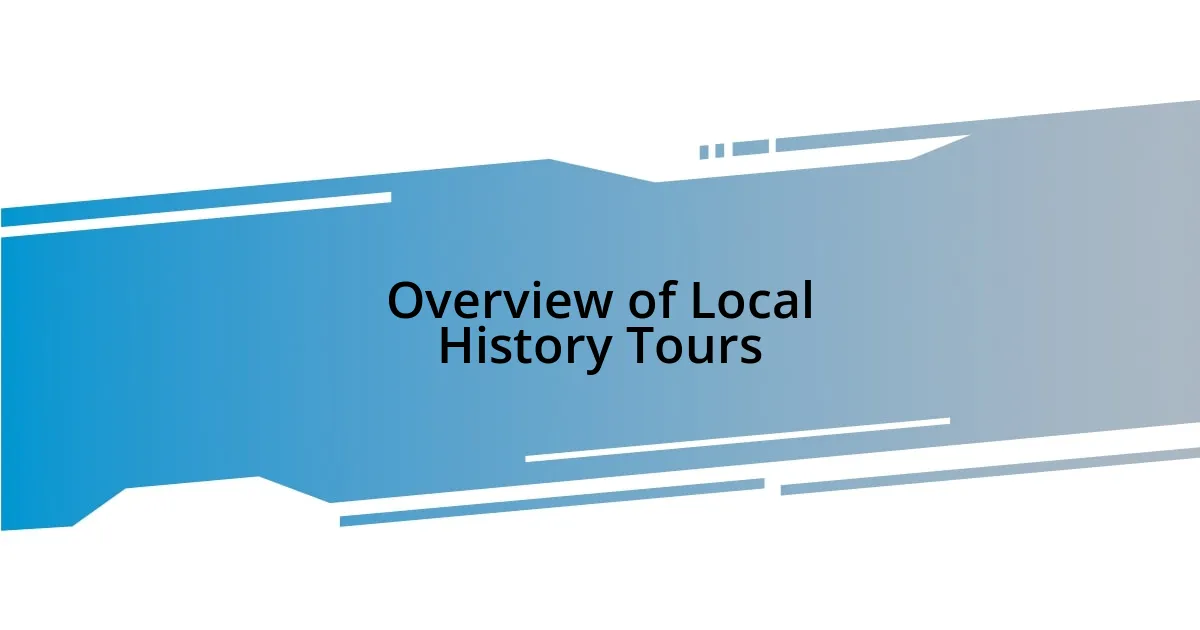
Overview of Local History Tours
Local history tours offer a unique lens through which to view a community’s past, illuminating the stories that shaped its present. When I first joined one, I was surprised by how each street corner held a narrative, filled with tales of triumphs and struggles. Have you ever paused to consider what lies beneath your feet as you walk through your neighborhood?
These tours often dive deep into the cultural and social fabric of an area, showcasing hidden gems that textbooks simply overlook. I vividly remember standing in front of a quaint old house, learning it was once a gathering place for social activists. It made me reflect on how much our surroundings can influence change and inspire future generations. Doesn’t it make you wonder what stories your own neighborhood holds?
Moreover, participating in local history tours fosters a sense of community and belonging. I recall chatting with fellow enthusiasts, sharing our own experiences and connections to the area. This communal experience makes learning not just informative but deeply enriching, as we collectively piece together the intricate mosaic that is our local heritage. Is there anything more rewarding than discovering the history that binds us together?
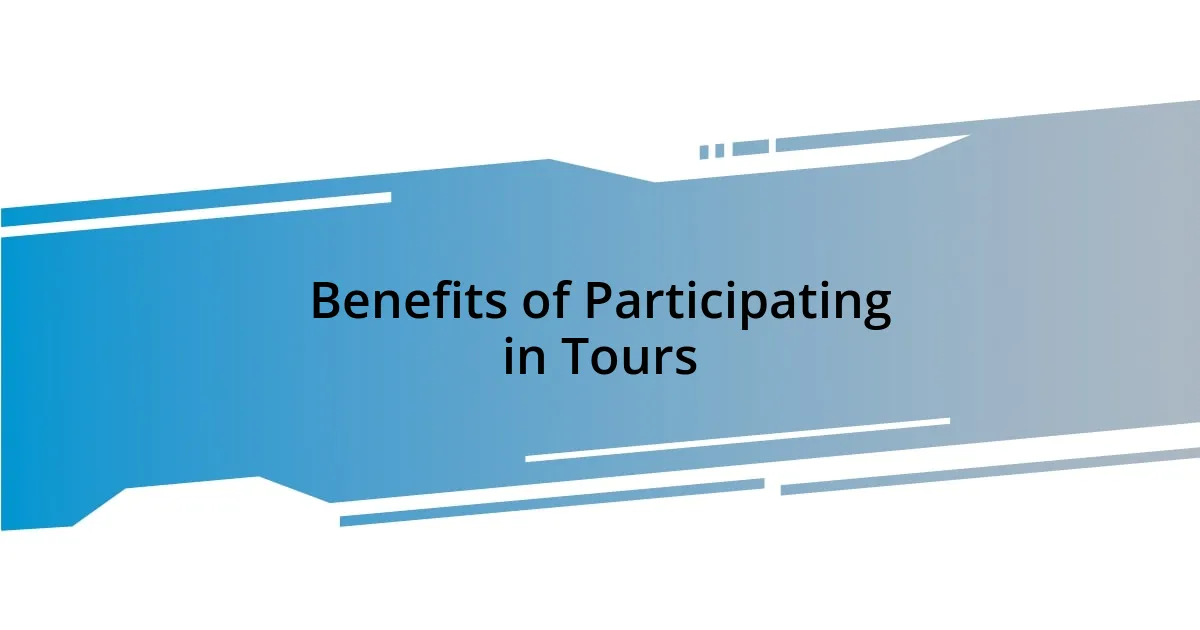
Benefits of Participating in Tours
Participating in local history tours offers a fresh perspective on familiar places. I distinctly remember visiting a nearby park where I used to play as a child. Learning about its transformation from a bustling market to a community green space added layers to my understanding of its significance. This deeper context not only enriched my appreciation for the park but also connected me to the countless stories woven into its history. Have you ever thought about the untold stories in your favorite hangouts?
Moreover, these tours are excellent opportunities to expand one’s knowledge base and appreciation for history. While walking through the streets, I absorbed facts that textbooks often miss. There was a moment when the guide shared lesser-known anecdotes about local leaders whose contributions shaped our town. It was enlightening and left me with a desire to explore more about my community’s historical figures. Isn’t it fascinating how knowledge can transform our perception of where we live?
Lastly, the friendships formed during these tours can lead to lasting connections. During my most recent tour, I struck up a conversation with a fellow history buff about our favorite local legends. We exchanged contact information and have since explored other districts together. This sense of camaraderie truly enhances the overall experience, as we bond over shared interests and discoveries. Can you recall a time when you connected with someone over a shared passion?
| Benefit | Description |
|---|---|
| Enhanced Perspective | Gaining deeper insights about familiar places |
| Knowledge Expansion | Learning lesser-known facts and stories |
| Building Connections | Forming friendships through shared interests |
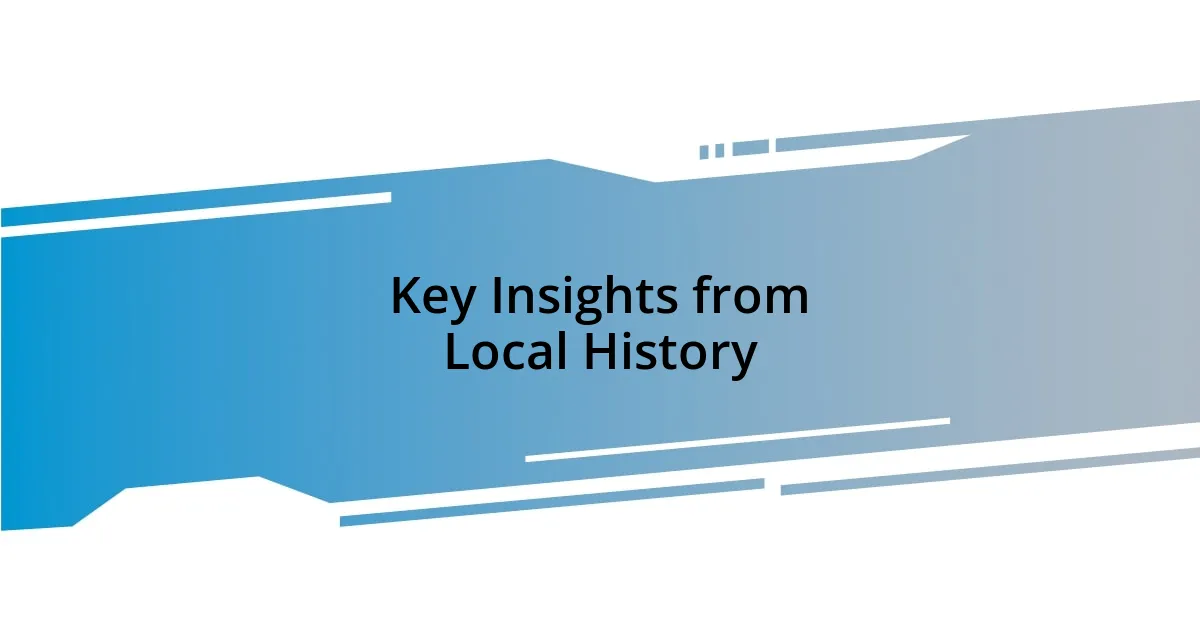
Key Insights from Local History
Engaging with local history truly opens up a treasure trove of insights. I remember a tour where we explored an old industrial area, guided by a local historian who passionately recounted the lives of factory workers who once toiled under harsh conditions. Their forgotten struggles resonated deeply with me. It stirred a sense of empathy that’s often lost in the rush of modern life. Recognizing their contributions transformed my view of the buildings I had previously considered just relics of the past.
Here are some key insights derived from local history:
- Personal Connections: Stories of individuals or families can evoke emotional responses, helping us relate to our community on a deeper level.
- Cultural Awareness: Understanding the diverse backgrounds that shaped the area fosters inclusivity and appreciation for different cultures.
- Ripple Effects: Learning how historical events influence current practices prompts reflection on our own roles within the community.
Reflecting on these insights, I find it fascinating how history isn’t just a subject; it’s the very fabric of our identities. Each conversation with a guide or fellow tour-goer becomes a thread, weaving together a richer understanding of where I belong.
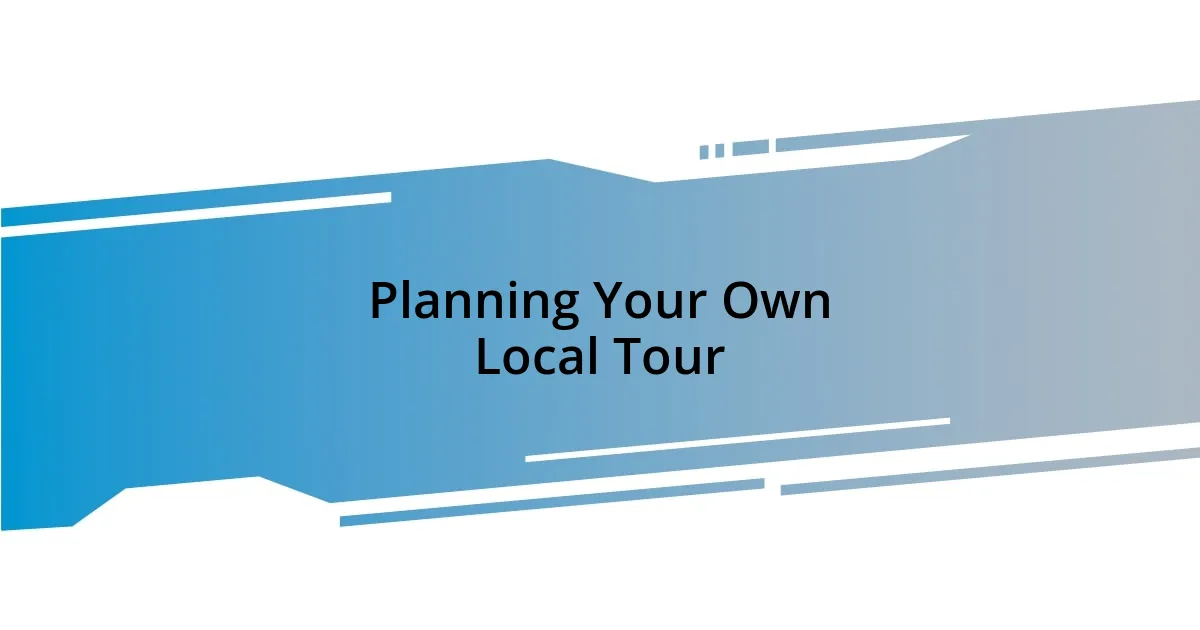
Planning Your Own Local Tour
When I decided to plan my own local history tour, the first step was to identify what intrigued me the most. I gravitated toward neighborhoods I frequently passed but had never fully explored. Do you have a place like that in your area? I discovered that setting a theme—for example, immigrant contributions to the community—helped guide my research and enriched my experience.
Researching is essential, but don’t be afraid to make it personal. I reached out to local historians and community groups, eager to gather stories and insights that might not find their way into traditional guides. One local archivist even shared a captivating tale about a long-lost mural in our town, igniting a newfound enthusiasm for unearthing hidden gems. Have you ever felt that spark of excitement from learning something unexpected?
Finally, the logistics can be both fun and tricky. I recall mapping out my route, making sure to include spots to pause, reflect, and even take photos. It made me consider how I could create a narrative through the places. Which locations would best illustrate my theme? Taking the time to plan in advance turned my own tour into not just a walk but a quest, complete with stories that connected the past to the present. What stories will you uncover on your own journey?
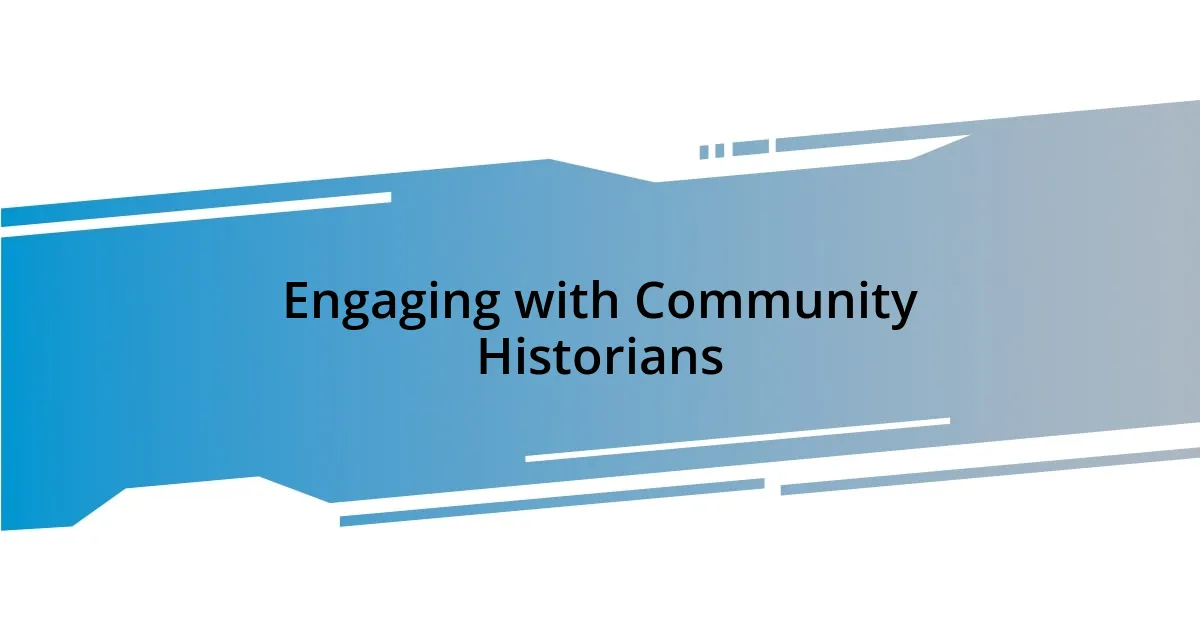
Engaging with Community Historians
Engaging with community historians can be one of the most enlightening experiences. I remember attending a workshop where a local historian shared not just facts but personal stories of resilience during a significant event in our town’s history. Hearing these narratives added a human touch, igniting a passion within me to dig deeper. Have you ever felt that spark when a stranger’s story clicks with your own experiences?
When I reached out to a community historian for insights on a project, I was pleasantly surprised by their willingness to share. Their enthusiasm was infectious, and it felt like I was uncovering secrets of our shared past together. I would ask questions, and they would draw connections to modern-day issues, showcasing the relevance of history to our lives. Isn’t it amazing how these engagements can illuminate paths we never considered?
Another memorable interaction occurred during a Q&A session after a local history tour. There was this sense of camaraderie, as we all shared our perspectives and reflections. It was fascinating to hear how others perceived the same events differently based on their backgrounds. This diversity of viewpoints enriched my understanding and made it evident that history is not a monologue, but a vibrant dialogue—what are the stories your community is eager to share?
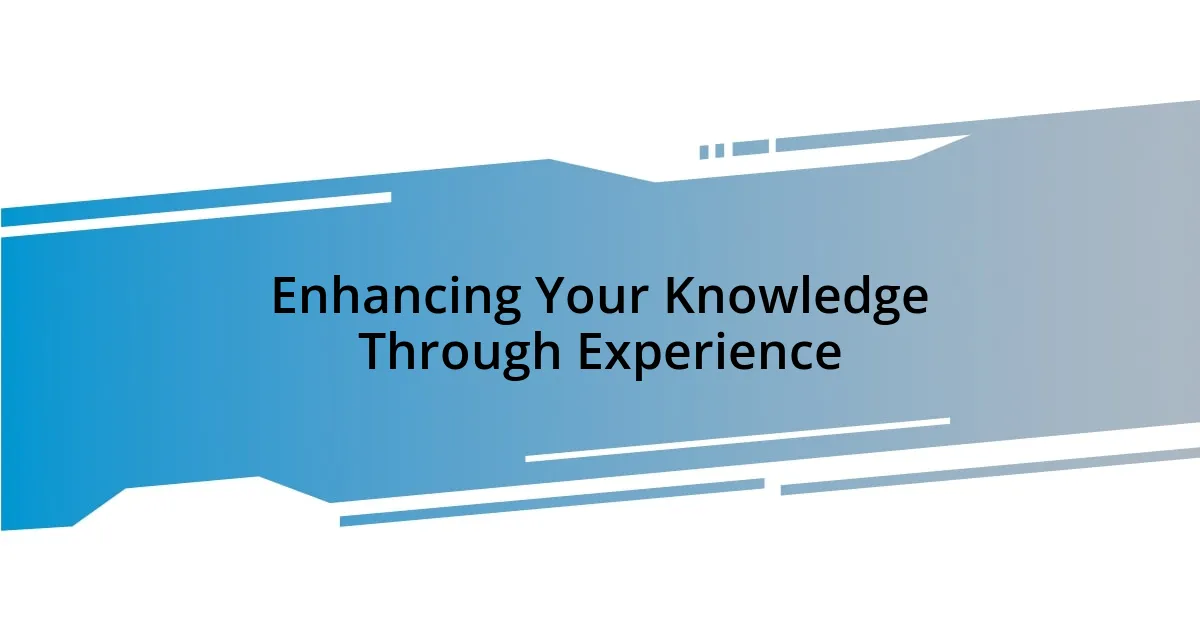
Enhancing Your Knowledge Through Experience
Experiencing local history firsthand has a profound way of enhancing your knowledge. I vividly remember walking through a centuries-old park, where a guide recounted tales of gatherings that shaped our community. The way the stories were brought to life made me feel as if I were part of those moments. Isn’t it thrilling to connect the dots between the past and present?
During one tour, I discovered the significance of a small, seemingly forgotten building. The guide shared an anecdote about a community meeting that ignited change, and I found myself reflecting on the power of grassroots movements. When history is narrated through such vivid personal accounts, it compels you to consider the influence of your own voice in the community. Have you pondered how your actions might echo through time?
The interaction with fellow participants also added layers to my experience. After one event, I struck up a conversation with a participant who had family ties to the events we learned about. Sharing perspectives deepened my understanding of the historical context and revealed just how interconnected our lives are with local history. It made me wonder—what personal narratives could enrich our understanding of each other and the places we call home?


